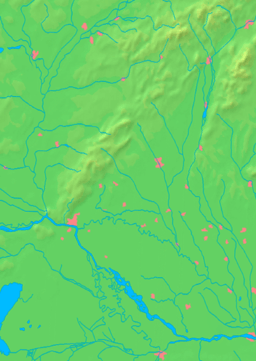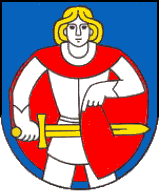Senica
| Senica | ||
| Town | ||
 City hall of Senica | ||
|
||
| Country | Slovakia | |
|---|---|---|
| Region | Trnava | |
| District | Senica | |
| Tourism region | Záhorie | |
| River | Teplica | |
| Elevation | 208 m (682 ft) | |
| Coordinates | SK 48°40′50″N 17°22′00″E / 48.68056°N 17.36667°ECoordinates: SK 48°40′50″N 17°22′00″E / 48.68056°N 17.36667°E | |
| Area | 50.316 km2 (19.427 sq mi) | |
| Population | 20,860 (31 December 2005) | |
| Density | 415/km2 (1,075/sq mi) | |
| First mentioned | 1256 | |
| Mayor | Branislav Grimm | |
| Timezone | CET (UTC+1) | |
| - summer (DST) | CEST (UTC+2) | |
| Postal code | 905 01 | |
| Area code | +421-34 | |
| Car plate | SE | |
  Location of Senica in Slovakia | ||
  Location of Senica in the Trnava Region | ||
| Wikimedia Commons: Senica | ||
| Statistics: MOŠ/MIS | ||
| Website: www.senica.sk | ||
Senica (Slovak pronunciation: [ˈseɲitsa]; German: Senitz; Hungarian: Szenice) is a town in Trnava Region, western Slovakia. It is located in the north-eastern part of the Záhorie lowland, close to the Little Carpathians.
Etymology
The name is derived from the word seno ("hay") with the suffix -ica used to form a place name.[1]
History
Senica's history is closely related with the Branč castle, built in 1251–1261. It was first mentioned in 1256 and received its city privileges in 1396, confirmed in 1463 and 1492. The city was affected by Turkish wars, anti-Habsburg uprisings and reformation and counter-reformations in the 17th century. In 1746, it became seat of the district within the Nitra county.[2]
Demographics
According to the 2001 census, the city had 21,253 inhabitants. 96.40% of inhabitants were Slovaks, 1.56% Czechs, 0.84% Roma and 0.14 Hungarians.[3] The religious makeup was 47.28% Roman Catholics, 31.18% people with no religious affiliation, and 17.03% Lutherans.[3]
Industry
A significant silk-producing company is based in Senica. The company was established in 1954 under the name ″Slovenský hodváb". In 2005 the production of viscose rayon was halted. After the merger of Slovenský hodváb and Kord to the new company Slovkor, it continued only with the production of Synthetic fiber for technical purposes. In February 2014 the factory chimney,[4] which dominated the city more than half century and was visible from long distance, was demolished.[5]
OMS lighting, one of the biggest luminaire companies in East-Central Europe, is also based in Senica. With around 1000 employees and exporting 98% of its production to more than 100 countries, the company is a referent in the economy of Senica.
International relations
Twin towns – Sister cities
Senica is twinned with:
 Bač, Serbia (2004)[6]
Bač, Serbia (2004)[6] Herzogenbuchsee, Switzerland (2004)
Herzogenbuchsee, Switzerland (2004) Pułtusk, Poland (2002)
Pułtusk, Poland (2002) Trutnov, Czech Republic (1998)
Trutnov, Czech Republic (1998) Velké Pavlovice, Czech Republic (2002)
Velké Pavlovice, Czech Republic (2002)
See also
- Banská Štiavnica, Slovakia (German: Schemnitz)
References
Notes
- ↑ Štefánik, Martin; Lukačka, Ján, eds. (2010). Lexikón stredovekých miest na Slovensku [Lexicon of Medieval Towns in Slovakia] (PDF) (in Slovak). Bratislava: Historický ústav SAV. p. 424. ISBN 978-80-89396-11-5.
- ↑ Mesto Senica – oficiálne stránky mesta
- 1 2 "Municipal Statistics". Statistical Office of the Slovak republic. Archived from the original on 17 December 2007. Retrieved 2007-12-25.
- ↑ List of tallest structures in Slovakia
- ↑ http://zahori.sk/25364/v-senici-padol-104-metrov-vysoky-komin-na-jeho-mieste-budu-obchody-a-byty/
- ↑ "Bač". Skgo.org. Archived from the original on 27 September 2007. Retrieved 2010-03-02.
External links
| Wikimedia Commons has media related to Senica. |
